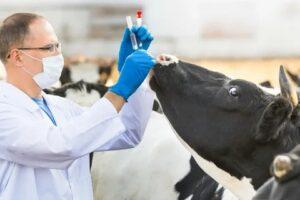Global Animal Biotechnology: Advancing Agriculture through Modern Science

Animal biotechnology refers to the direct manipulation and modification of animals for agricultural purposes. Through the application of genetic engineering and reproductive technology, animal biotechnologists aim to develop livestock with desirable traits like increased productivity, disease resistance and greater nutritional value. By improving animal health and welfare, biotechnology also allows for more sustainable and humane farming practices worldwide.
Gene Editing for Trait Enhancement
One important method employed in Animal Biotechnology is genome editing, which allows scientists to precisely alter the DNA of animals. For example, CRISPR-Cas9 gene editing allows specific genes to be added, removed or modified with great accuracy. Livestock can thereby be given traits like enhanced growth rates, improved feed efficiency or reduced methane emissions. Gene editing also shows promise for developing animals resistant to viral diseases that cause huge economic losses each year. By conferring disease resistance through biotechnology rather than antibiotics, overuse of drugs in livestock can be curtailed for better public health outcomes.
Reproductive Technologies for Faster Genetic Gains
Techniques like artificial insemination, embryo transfer and in vitro fertilization enable farmers to multiply elite animals at a much faster rate than traditional breeding. Sexed semen sorting allows producers to preselect the gender of offspring for dairy or beef production. Genome-wide selection further enhances the reproductive technologies by identifying marker genes associated with economically important traits. As a result, desirable genetic variants can be rapidly disseminated throughout commercial herds and flocks worldwide. This accelerates genetic progress, allowing livestock industries to meet rising global demand for animal proteins in a sustainable way.
Nutritionally Enhanced Animal Products
Biotechnology also offers novel ways to enhance the nutritional profile of meat, milk and eggs. For example, genetically engineered livestock can be developed to produce animal products with greater contents of omega-3 fatty acids, vitamins, minerals and amino acids. Such nutrition-fortified foods provide important health benefits to consumers while maintaining natural taste and appearance. Biotechnology could similarly produce low-fat or lactose-free dairy items tailored to the needs of specific population groups. Development of transgenic poultry generating therapeutic proteins in eggs also holds promise as an affordable biomanufacturing platform in the future.
Environmental Sustainability through Biotech
As global demand for meat and milk increases, there is growing pressure to optimize production while minimizing environmental impacts. Animal biotechnology aids in developing more eco-friendly livestock through traits like improved feed efficiency, slower growth rates and reduced methane emissions. Genetically modified low-emissions cattle have already been reported to decrease enteric methane output by over 30%. Biotech could also generate multi-purpose animals that fulfill meat, milk and labor roles, which benefits smallholder farmers in developing nations. With responsible innovation, animal agriculture could therefore meet demand sustainably through biotech-derived environmental benefits.
Public Perceptions and Ethical Considerations
While the potential benefits are tremendous, animal biotechnology also faces some challenges from social and ethical perspectives. Issues over animal welfare, environmental risks from gene escape, and perceived “unnaturalness” of genetic modification give rise to criticism from some advocacy groups. There are also debates around intellectual property and commercialization spreading transgenic traits worldwide. Most major scientific bodies agree biotechnology is not intrinsically unsafe if properly regulated, but public distrust remains an obstacle. Concerted communication efforts are thus needed to explain how biotech can augment rather than replace traditional practices for sustainability. With prudent regulation and oversight ensuring human and environmental safety, biotechnology promises to revolutionize animal agriculture globally over the coming decades.
applications of animal biotechnology are progressively advancing livestock production, genetics, nutrition, health and environmental performance on a global scale. Through modern tools like gene editing and assisted reproduction, the agricultural sector aims to meet rising demand for animal proteins sustainably into the future. While social and ethical considerations require prudent regulation, responsible innovation shows great potential to benefit both industrial and smallholder farmers worldwide. With continued progress guided by science-based policy, biotechnology will likely transform global animal agriculture for a more profitable and sustainable food system serving humanity.
Get More Insights On Animal Biotechnology
About Author
Vaagisha brings over three years of expertise as a content editor in the market research domain. Originally a creative writer, she discovered her passion for editing, combining her flair for writing with a meticulous eye for detail. Her ability to craft and refine compelling content makes her an invaluable asset in delivering polished and engaging write-ups.
(LinkedIn: https://www.linkedin.com/in/vaagisha-singh-8080b91)
- Art
- Causes
- Crafts
- Dance
- Drinks
- Film
- Fitness
- Food
- Jeux
- Gardening
- Health
- Domicile
- Literature
- Music
- Networking
- Autre
- Party
- Religion
- Shopping
- Sports
- Theater
- Wellness


